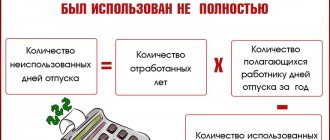What it is?
The most frequently asked question from employees is whether vacation from previous years expires and how often it can be taken. Over several years of service, various situations regarding labor relations may occur, including when an employee does not have time to take annual paid leave. Over time, vacation pay accumulates and many people fear that these days may be lost.
Unused vacation time does not expire even if the employee quits or goes on maternity leave. Every worker is given the right to accumulate days for rest. The issue of vacation pay worries many citizens, since there is widespread information on the Internet that vacation pay may disappear. It is important to know the entire operating algorithm in order to understand how vacation pay is calculated. We also must not forget that each employee can choose his preferred time of year to spend his own vacation.
general information
Let's take a closer look at this issue. According to modern legislation, every employee has the right to receive an annual leave of 28 days. An employee can use the vacation provided in different ways. Moreover, the first part should be exactly half of the total number of days. The second part is designed differently, depending on the wishes of the employee.
The situation becomes more complicated if several employees did not take vacation in previous years. The Labor Code regulates the provision of rest to employees in each reporting year. Transfer of leave is allowed only in exceptional cases with the written consent of the worker.
Compensation
To motivate employees to rest, the Labor Code limits the possibilities of monetary compensation for vacations.
According to the law, the required 28 days of vacation can only be used:
- it is impossible to receive money instead in the current working year;
- compensation is allowed only if the vacation was postponed and the number of days in total exceeded 28 (the days making up the difference are the only ones that the employee can be compensated for during the next year);
- after two years, they can only count on compensation if they are fired.
Upon dismissal
For those who decide to leave the company, there are several options for using vacation days that were not used during the period of work.
Opportunities and conditions:
- if at the time of dismissal there is unfulfilled vacation for the current year, you can use it to reduce the days intended for working under the law (depending on the number of days of vacation, you can reduce it to two working weeks);
- vacation for the current year can be obtained not in days, but in money;
- if the number of days of current vacation at the time of dismissal is more than 14, then the difference can only be compensated;
- past vacations that have not been used for more than two years will be compensated in cash.
The choice of option depends only on the employee. The employer does not have the right to impose a method of disposing of unused vacation days.
Therefore, if it is not intended to reduce the working time due to vacation, in order to compensate for unused days at the time of dismissal, the employee only needs to monitor the work of the accounting department. Severance pay should be calculated taking into account unrealized vacations without additional efforts on the part of the employee.
https://youtu.be/ZkbkZjwC38Y
Important Points
The employee receives the right to rest only six months after official registration. It is better to take the accumulated number of days, otherwise the resulting debt for paid vacation pay will have to be returned upon dismissal. A company may be fined if people's legal rights to annual leave have been violated. All required rest days must be spent in full during the year. In practice, the situation looks somewhat different. In pursuit of development and obtaining financial results, people simply have no time to rest. In this regard, employees are interested in whether unused vacation from previous years expires and how to apply for it? Many managers retain specialists and deliberately reduce their rest time. In this case, there is a direct violation of current legislation.
Often the employees themselves do not want to leave for certain reasons. Some people don't want to lose money because a vacation day costs much less than a working day. Others want to receive additional payment upon dismissal. Of course, everyone pursues their own personal goals, but there is a certain order that must be followed. If an organization does not allow staff to take proper rest, serious consequences can arise. This is due to the fact that this employer’s obligation is fixed in the Labor Code.
Poor performance or evasion of this may result in a large fine and suspension of activities. Employees themselves can submit an application to the supervisory authorities regarding the refusal of well-deserved rest by the employer.
Unused vacation for last year: new law
From 2020, employees can use all vacation days that have accumulated over the previous period. Also, they can be added to paid leave for the current year. If the employee has a certain number of days left, they move on to the next period.
The new law obliges employers to pay for travel packages for employees who go on short vacations. According to the new changes, managers have the right to spend money on vacations for their wards, and then deduct such expenses when calculating income tax. Workers can only count on spending their holidays at domestic resorts. The right to such rest is given not only to the worker, but also to his spouse. 50,000 rubles are allocated annually per staff unit.
In addition, changes have been made to the Labor Code that apply to workers with three or more children under 12 years of age. This category of citizens is granted leave at a time convenient for them at their personal request. In other words, parents with many children can take paid leave at any time.
What's happened
At the beginning of 2020, deputies began to prepare the next changes to the Labor Code of the Russian Federation related to vacations.
We were talking about an initiative that subsequently changed the procedure for providing paid leave for certain categories of workers, for example, for employees who have three or more minor children under the age of 12. This amendment was introduced into the Labor Code by Federal Law No. 360-FZ of October 11, 2018, as a result of which a new article, 262.2, appeared in the Labor Code of the Russian Federation. Now this category of workers has the right to take their annual basic paid leave at a time convenient for themselves, on the same basis as parents raising disabled children under the age of 18 (see Article 262.1 of the Labor Code of the Russian Federation). At the same time, every worker should know that he has the right to annual paid rest, the amount of which is 28 days (for some categories of citizens it may last longer). At the request of the employee, it can be divided into periods. In this case, one of the parts must be at least 14 days.
If an employee takes vacations every year, there are usually no problems. But in a situation where the employee did not use all the allotted days, questions arise.
International legal acts
According to current legislation, an employee first needs to take vacation for the previous period, and only then for the current one. Ratification of the International Labor Organization convention encourages employees to understand the issue of whether vacation from previous years expires. This document provides for the preservation of the right to annual paid rest for 21 months. However, upon dismissal, a specialist has the right to all vacation days for previous years, which are provided to him by law. This right can be exercised by providing monetary compensation for the accumulated period.
The Convention does not allow the permanent replacement of guaranteed holidays with cash payments. Therefore, you can demand compensation from the employer only upon dismissal. The law stipulates that payment cannot be received until the employment relationship is officially terminated. However, if upon dismissal the employer compensates for unused vacation for 21 months, the worker can contact the State Labor Inspectorate. The inspection will reveal the fact of violation and bring the employer to administrative liability. In order to avoid problems with the law, it is necessary to promptly send employees on legal vacation in accordance with the Labor Code of the Russian Federation.
What is meant by unused vacation?
The so-called non-vacation leave is the rest time allocated to employees within 12 months, which could not be used for some reason. Since some employees have the right to be absent from the workplace not for 28 days, but longer, since they have additional or extended rest, it is not at all a fact that during the year they will choose all the time allotted to them. It must be remembered that all accumulated days can only be used within the next 12 months, and nothing more. After another 365 days, you will no longer be able to use this right. Employers cannot keep a person at work without rest for more than two years. But where will the unused vacation days go, and if quite a lot of them have accumulated? They remain and don’t go away, but you won’t be able to use them the way you want.
This is important to know: Application for leave before maternity leave: sample 2020
In general, unused vacation can be successfully used over the next 12 months. And then you will have to forget about it until the day of dismissal. After this day comes, the person will receive compensation for all accumulated early days. What are the reasons that unfilled vacations may appear? Of course, only good reasons will force a worker to remain at work without the rest he is entitled to. Transfer to another year is possible:
The reasons for an employee’s refusal to take a vacation are recorded in personnel records, because if there are no serious reasons to stay at work, then there is no reason to miss another vacation. If an employee himself asks the employer to postpone the required days of inactivity to the next year, then the reasons may be as follows:
- family circumstances;
- deterioration of the employee's health.
If you haven’t taken the required days off over the past period of time, then perhaps this is due to the employer’s initiative caused by the following reasons:
- the impossibility of transferring the work of this employee to someone else;
- reorganization of the employer;
- urgent business trip;
- checks in the organization;
- fulfilling the duties of a manager.
The reasons stated above are enshrined in Art. 124 Labor Code of the Russian Federation.
Vacation or compensation?
Often workers take monetary compensation instead of annual vacation pay. Of course, this does not mean that leave from previous years can be permanently exchanged for a refund. The law states that compensation is paid to citizens who have accumulated more than 28 days of calendar leave. This also applies to employees who decide to terminate their employment contract with the company. In other words, employees who have an extended vacation period, as well as those who want to quit, are entitled to receive monetary compensation.
What is the employer avoiding?
We already know the answer to the question: does unused vacation from previous years expire? Workers who rarely take paid time off end up with a large number of unused days. This state of affairs does not suit many employers.
When checking an organization by a labor inspectorate, many questions may arise. There is a direct relationship between the number of days accumulated and the amount of compensation. Therefore, employers often offer employees different options in order not to pay money for unused days.
What to look for?
The situation is somewhat worse when the employer invites the employee to fill out several applications for short vacations that fall on weekends. Thus, the employee can receive more money, since vacation pay is paid for every Saturday and Sunday. However, the specialist loses days of rest, since work is not carried out on weekends.
If the worker officially formalizes legal rest and continues to work, then the employer pays only vacation pay. At the same time, the money earned is lost, since the employee does not officially work during this period of time. Of course, this situation is convenient for the employer, but it is critical for the worker. Therefore, it is important to know the basics of labor law, since every person is faced with the question of whether vacation days from previous years expire.
Employer Responsibilities
Unused vacations carry over to the next year, so workers don’t have to worry about it. In this matter, the law is completely on the side of the employees. However, officials may reschedule leave if there are compelling reasons. The employer must notify subordinates of the opportunity to take annual paid leave, and also provide a choice of periods for rest. An employee can independently choose the date on which it is better to assign a day off. At the same time, the employer acts as a guarantor that unused vacation for the previous year will not be burned, but will be accumulated in the schedule.
If personnel rest in accordance with the established document, then the risk of production collapse is minimal. Otherwise, people will go on vacation in a chaotic manner, which will lead to disruptions in the work process. Do employees who have worked for the benefit of the company for several years lose their holidays from previous years? It is important to remember that long-term work has a negative impact on a person’s attitude towards work and health.
Is it necessary to notify an employee of unused vacation days?
This is precisely the approach that was applied by the courts of general jurisdiction in the cases of those citizens who appealed to the Constitutional Court of the Russian Federation with a complaint about the unconstitutionality of Part 1 of Art. 127 of the Labor Code of the Russian Federation and Part 1 of Art. 392 Labor Code of the Russian Federation. The unused part of the annual leave must be provided to the employee, as a rule, before the end of the working year, but no later than 12 months after the end of the working year for which it is granted. This is provided for in Part 2 of Art. 12 of the Law of Ukraine “On Vacations” dated November 15, 1996.
Directly opposite decisions were made by the courts, which interpret the provisions of the Convention as establishing only a maximum period for using vacation during the period of validity of the employment contract and in no way limiting a certain part 1 of Art. 127 of the Labor Code of the Russian Federation, the scope of the right of a dismissed employee to receive monetary compensation for unused vacation.
In accordance with Article 115 of the Labor Code of the Russian Federation, the employer must provide the employee with annual paid leave of 28 calendar days. In some cases, for example, if the employee’s working conditions are dangerous, labor legislation also provides for additional leave. If an employee does not have the right to additional leave, the employer, taking into account its production and financial capabilities, can establish it. This is stated in Article 116 of the Labor Code of the Russian Federation. Will an employee’s rest days be lost if for some reason he was not on vacation?
This is important to know: If an employee went on sick leave before a vacation, is the vacation transferred?
Employer's liability
Sometimes officials use illegal methods to provide a reduced number of vacation days. If an employee proves that unlawful actions were committed against him, the company may be held administratively liable. Such violations may result in a fine of 50,000 rubles.
This way, unused vacation days cannot disappear. However, the law prohibits their accumulation in large quantities. The responsibility of the manager to provide annual paid rest to his wards is also established.
Compensation for vacations that were not previously used
As it became known, unused vacation does not expire and does not go anywhere.
Days that are not used do not disappear. But the law prohibits accumulating more than necessary. The Code also establishes that a manager cannot refuse to provide time for rest. Such a violation may result in a fine of at least 50 thousand rubles.
Until recently, it was possible not to go on vacation, but to get money for it. Currently, only those who have a vacation duration of more than 28 days per year can receive compensation for vacation - these are, for example, extended or additional vacations. If an employee is only entitled to vacation of 28 calendar days, then it is impossible to replace part or all of this vacation with money! Vacation cannot generally be postponed for more than 24 months. And it is no longer profitable for management to accumulate vacation days.
This is due to several reasons:
- When checking, the Labor Inspectorate may ask many unnecessary questions.
- The more unused vacation an employee accumulates, the more the company will incur costs for compensation.
But employers often still try to reduce rest time. For this purpose, several techniques are used:
- Vacation is given, but it starts on Friday. That is, legal days off are added to the days of rest.
- The employee is not allowed to rest at all, but is asked to write a statement, for example, on weekends.
- The leave is issued, but in fact the employee continues to perform his duties.
These methods cannot be called effective. The management of the enterprise convinces that an employee can receive two payments at once - wages and vacation pay. And in this case, the employee loses the right to legal rest.
Reasons for refusing leave
There are a number of reasons why an employer may not allow a ward to take a well-deserved vacation. Among these reasons are the following:
- bankruptcy of the organization;
- performing urgent work;
- lack of replacement specialists;
- the employee performs part of the duties during the rest period;
Even in the situations listed above, unused vacation from previous years does not expire. In this case, it does not matter the position held, whether the employee is on maternity leave or simply decided to take vacation pay upon dismissal. The law states that every employee has the right to save vacation days and use them next year.
Unused vacation accumulates
Will unused vacations expire in 2020? To answer this question, let us turn to the norms of the Labor Code of the Russian Federation. It states that if, due to production needs, the employer cannot provide the employee with leave in the current working year, then it can be transferred to the next working year. And that during this next year the leave must be used by the employee. And failure to provide vacation for 2 years in a row is prohibited (Article 124 of the Labor Code of the Russian Federation).
This means that unused vacation days for 2020 do not expire, but are transferred to future periods. Moreover, this happens with all the days of unused vacation for all the years worked by the employee. That is, all these days accumulate. In other words, in 2020, the employee will have the right to go on vacation for all days of unused vacation plus 28 calendar days that he will be entitled to for 2020 (Article 115 of the Labor Code of the Russian Federation).
Employee Responsibilities
The employee must notify the employer in advance of his desire to take an annual day off. Moreover, this must be reported no earlier than two weeks in advance. Part of the vacation cannot be burned, in accordance with the Labor Code of the Russian Federation and other adopted regulations. The question of whether vacation from previous years expires worries workers, since people sometimes fail to use it to the fullest. Today this problem is discussed quite often. In this article we will look at the very concept of “remaining days” and the main ways to use them.
So, the Constitution of the Russian Federation guarantees the right of workers to legal leave at the place of work. This provision is also enshrined in the Labor Code. The law defines various forms of leave and situations for their provision. Every working person can take an annual paid holiday. Additional days may be provided due to work under special conditions. These include working in hazardous work, irregular working hours, etc. Many people are interested in whether additional vacations from previous years expire and how they can be used? It is important to remember that they are subject to the same rules as regular ones. Additional days can be added to an upcoming or current vacation. Upon dismissal, the employee is required to pay compensation for these days.
An employee may take unpaid leave, also called “administrative leave.” It is used by workers if there is a need to leave for several days. In this case, the employer may refuse to provide the employee with such leave. However, the Labor Code establishes some exceptions in which the application must be signed. This is the birth of a child, a wedding or the death of a loved one.
Difficulties with compensation for unused vacation in the past
The more unused vacation days an employee has accumulated, the greater the amount of compensation in the event of dismissal, the employer will have to pay him (Article 127 of the Labor Code of the Russian Federation). This is a well-known norm of the Labor Code of the Russian Federation, which until a certain time no one argued with. But after Russia ratified Convention No. 132 of the International Labor Organization “On Paid Leave,” some employers decided to approach this issue differently.
Articles on the topic (click to view)
- Fine for late payment of vacation pay
- What to do with unused vacation
- What to do if your employer does not pay vacation pay
- How long after employment is vacation allowed?
- Is maternity leave taken into account when calculating pensions?
- Accounting for compensation for unused vacation
- Dismissal while on maternity leave
They refused to pay their employees compensation in full for a long period of work, which for some employees amounted to more than 10 years. In court, the employers motivated their decision by the fact that, in accordance with this Convention, unused vacation must be provided to the employee within 18 months after the end of the working year (Clause 1, Article 9 of ILO Convention No. 132). And if it is not provided, then the employee had to apply for protection of his rights within 3 months, counting from the moment his rights were violated (Article 392 of the Labor Code of the Russian Federation). Considering that more than 21 months have passed since the end of the years for which the employee demanded compensation (18 months + 3 months), the employer will not pay him anything.
This is important to know: Is leave without pay included in the length of service?
To be fair, we note that not all courts agreed with this position of employers. That is, judicial practice was not uniform. In the end, the matter came to the Constitutional Court. And he explained this: the established 18-month period is applicable only to working persons and is not applicable to those who quit. The expiration of this period does not mean the termination of the employees’ right to the unused part of the vacation and the impossibility of receiving compensation for it.
As for the deadline for going to court, it is counted not from the date of expiration of the working year for which the employee did not use vacation and wants to receive compensation, but from the date of dismissal. That is, from the date when the employee was not paid all due amounts. And today the period for going to court is 1 year (Part 2 of Article 392 of the Labor Code of the Russian Federation). The corresponding norm was introduced into the Labor Code of the Russian Federation in 2020 (Resolution of the Constitutional Court of the Russian Federation of October 25, 2018 N 38-P).
Reasons for taking a vacation
For the convenience of recording rest days and maintaining a continuous production process, a vacation schedule is drawn up. This document is issued by mid-December and is valid throughout the next year. Scheduling vacations is a business necessity, not just a whim. Even small companies with several employees are required to maintain it. If management neglects to draw up such documents, they will face an administrative fine. Based on the workers’ statements, an order is issued that confirms the employee’s absence from the workplace. Vacation can only be postponed with the written consent of the employee.
What conclusion did the Constitutional Court of the Russian Federation come to?
https://youtu.be/gXAUMelo9as
So, in particular, all accrued amounts for the last 12 months are taken into account, including salaries, sick leave and bonuses, not to mention incentive payments.
Also, taking into account that it is not realistic to foresee all possible problems, both production-related and personal, a year in advance, the law gives the right to make changes to the schedule with the transfer of rest time to another time.
In pursuance of the norms of the law, namely Article 123 of the Labor Code of the Russian Federation, each institution draws up a vacation schedule until December 15 based on the establishment of planned vacation periods for the next year.
Brief conclusion
All employees need to know the norms of the Labor Code, as this will allow them to competently build relationships with management. The right of workers to proper rest is enshrined in current legislation. There is no concept of “vacation burnout”, so everyone can exercise their right to vacation. If an employee has not been on vacation for two years in a row, the employer may be fined or the company's activities suspended for up to 90 days. However, the employee will retain all vacation days in full.
Due to the introduction of some of the changes discussed above, employees considered that vacations for previous periods would expire. Not only ordinary employees are confused in this issue, but also accountants. The new law does not affect the basic principles of granting leave. If a company does not provide leave to workers, the employer may be held liable. It is important to remember that not in all cases it is possible to replace proper rest with a cash payment. First of all, this is not beneficial for the employee himself, since not only personal time is lost, but also money.
The presence of unused days off is a consequence of the fact that the worker was unable to book vacations on time. Therefore, they automatically move to the next period. In this regard, employees do not have to worry about whether unused vacation from previous years is lost. Vacation pay can only be transferred if there are compelling reasons for this on the part of the employee or employer. In this article, we reviewed material about whether vacation for previous years expires and in what ways you can compensate for the remaining days.
Does unused vacation expire from 2020?
According to the Labor Code of the Russian Federation, unrealized days of legal rest do not expire. Labor standards provide several options for their use.
The legislation allows for the division of the vacation period into parts, and also makes it possible to transfer all or part of the vacation to the year following the one in which the right to it was earned.
In practice, if an employee has several days of rest left from last year, they are automatically included in the vacation period of the next year. Therefore, the employee sells them first when he goes on vacation in the year following the current one.
If several annual holidays are missed in a row, then legal norms prohibit the use of vacations for more than two working years.
Depending on how unused leave arose, there are rules for its implementation and compensation:
- If an employee did not take advantage of the vacation or part of it in the year such a right became available, then he will be able to use the remaining days next year.
- If, when summing up vacations, their duration exceeded the established one (without special circumstances - 28 days), then the days exceeding the norm can be replaced with monetary compensation.
- If there has been no vacation for two years, then vacation can only be used for the previous year. The same rule applies to compensation.
- Replacing annual basic leave with money in the current year is prohibited.
In addition, certain responsibilities are imposed on the employer, who is not allowed to refuse to provide employees with rest for two years in a row. Otherwise, the labor inspectorate may issue a fine to the company.
In addition to a fine, unused employee vacations can lead to financial and work difficulties:
- a sudden desire by an employee to take advantage of all his existing days of rest will immediately disrupt the work schedule of other employees of the enterprise and may negatively affect the production of work as a whole;
- if there are a lot of days off by the time the employee is dismissed, then the amount of compensation will be significant;
- The need to allocate funds from the assets of the enterprise can create difficulties both for management and for the company as a whole.
Despite this, the practice of working without vacations is actively used in many enterprises. Employees are confident that compensation for all saved vacation days will be paid to them when dismissal occurs. Some, expecting a job change, specifically refuse to go on vacation so that the severance pay becomes larger.
Sample application for unused vacation
However, after the signing of the convention of the International Labor Organization, this postulate ceased to be an axiom:
- starting in 2010, employers began to refuse compensation even upon dismissal, if the leave was not taken for more than two years;
- the only option in this case was to go to court;
- the result depended entirely on the judge's decision.
Until 2020, judicial practice on this issue was ambiguous. Most judges considered the provisions of the labor code to be a priority, but there were also judges who placed international standards higher.
Today, the labor and legal communities have come to a consensus that Labor Code norms are a priority for resolving issues of unused vacation. Now the employee does not have to worry about whether unused vacation is expired. Unrealized days of legal rest may be transferred to the next working year, and upon dismissal, the employer will be required to pay them in full.
This is confirmed by Rostrud letter No. 1921-6 (06/08/07), according to which the right to use any unused vacation must be retained by the employee. The clarifications allow for the use of remaining vacation days even after a two-year period by agreement of the parties - the employee and the employer. These days can be added to the employee’s next vacation schedule.
If the total number of vacation days in the current year exceeds 28 days, then the employer can compensate the employee for the difference in money. However, this is not an obligation, but the good will of the enterprise management.
Employer responsibilities in 2020 include:
- providing employees with the opportunity to take annual holidays;
- providing employees with additional days of rest if there are legal grounds;
- compensation to the employee for all unrealized vacation days accumulated during the period of work at the time of dismissal.
Payment upon dismissal of an employee is calculated on the basis of average earnings for the year of work preceding the dismissal. There are no indications in labor legislation that unused vacation days, if the two-year period for their implementation is missed, must be canceled without compensation to the employee.











